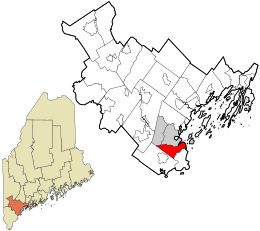South Portland, Maine | |
|---|---|
 A South Portland marina overlooking the city of Portland | |
| Nickname(s): | |
| Motto: Forward | |
 Location in Cumberland County and the state of Maine. | |
| Coordinates: 43°37′54″N 70°16′22″W / 43.63167°N 70.27278°W | |
| Country | United States |
| State | Maine |
| County | Cumberland |
| Incorporated (town) | March 15, 1895 |
| Incorporated (city) | March 22, 1898 |
| Government | |
| • Type | City Council and City Manager |
| • City Manager | Scott Morelli[3] |
| • Mayor | Misha C. Pride[4] |
| Area | |
| • Total | 14.01 sq mi (36.29 km2) |
| • Land | 12.04 sq mi (31.19 km2) |
| • Water | 1.97 sq mi (5.10 km2) |
| Elevation | 23 ft (7 m) |
| Population (2020) | |
| • Total | 26,498 |
| • Density | 2,200.10/sq mi (849.49/km2) |
| Time zone | UTC-5 (Eastern (EST)) |
| • Summer (DST) | UTC-4 (EDT) |
| ZIP Codes | 04106, 04116 |
| Area code | 207 |
| FIPS code | 23-76750 |
| GNIS feature ID | 0575893 |
| Website | www.southportland.org |
South Portland is a city in Cumberland County, Maine, United States, and is the fourth-most populous city in the state, incorporated in 1898. At the 2020 census, the city population was 26,498.[6] Known for its working waterfront, South Portland is situated on Portland Harbor and overlooks the skyline of Portland and the islands of Casco Bay. Due to South Portland's close proximity to air, marine, rail, and highway transportation options, the city has become a center for retail and industry in the region. The Maine Mall, the largest shopping mall in the state, is located in South Portland. It is also a designated Tree City USA community.[7]
Despite the name, South Portland was never part of the city of Portland, but rather part of Cape Elizabeth, separating in 1895. However, both Cape Elizabeth and Portland were once part of Falmouth. Cape Elizabeth, then including what later became South Portland, broke away from Falmouth in 1765. South Portland is a principal city of the Portland–South Portland–Biddeford metropolitan area.
- ^ Harrington, Duke (July 25, 2014). "Debate hard fought, but likely not over". South Portland Sentry. Retrieved July 25, 2014.
The new zoning regulation for the Park City – so-called for its 15 public green spaces, including scenic Bug Light Park next to, and largely owned by PPL — bans bulk loading of all crude oil onto ships. It also bans construction of infrastructure needed for that purpose.
- ^ Kaplan, Melanie D.G. (October 18, 2019). "Things to do in South Portland, Maine". The Washington Post. Retrieved May 19, 2020.
SoPo, as it's called, is a city unto itself, a former shipbuilding center with a working waterfront that feels like a beach town.
- ^ "City of South Portland - Executive Department". Retrieved April 25, 2018.
- ^ "City Council Members & Contact Information". Retrieved January 1, 2024.
- ^ "2020 U.S. Gazetteer Files". United States Census Bureau. Retrieved April 8, 2022.
- ^ "Census - Geography Profile: South Portland city, Maine". United States Census Bureau. Retrieved January 8, 2022.
- ^ "Tree City USA: Programs: Project Canopy: Help Trees help you". www.maine.gov. Retrieved September 17, 2024.
